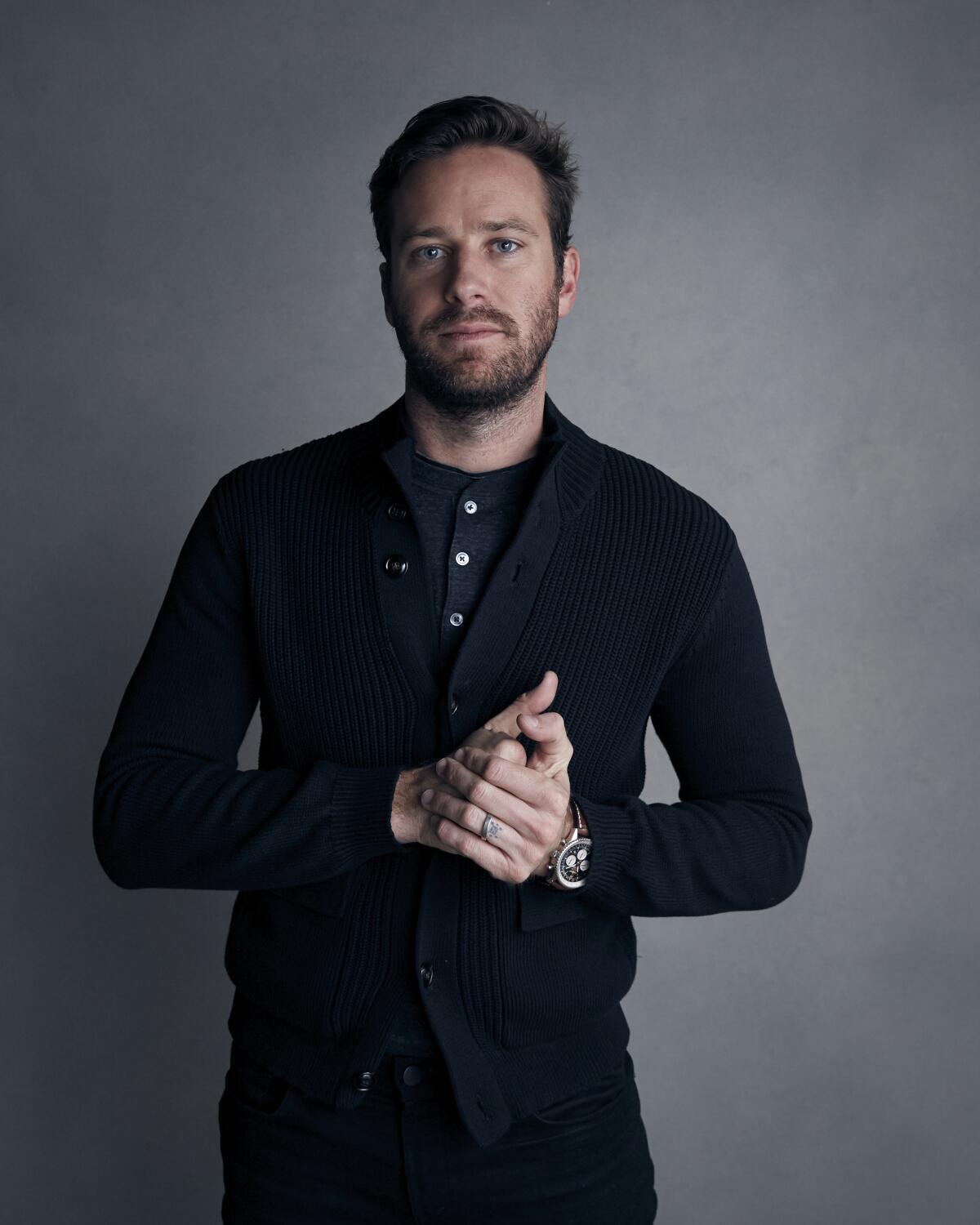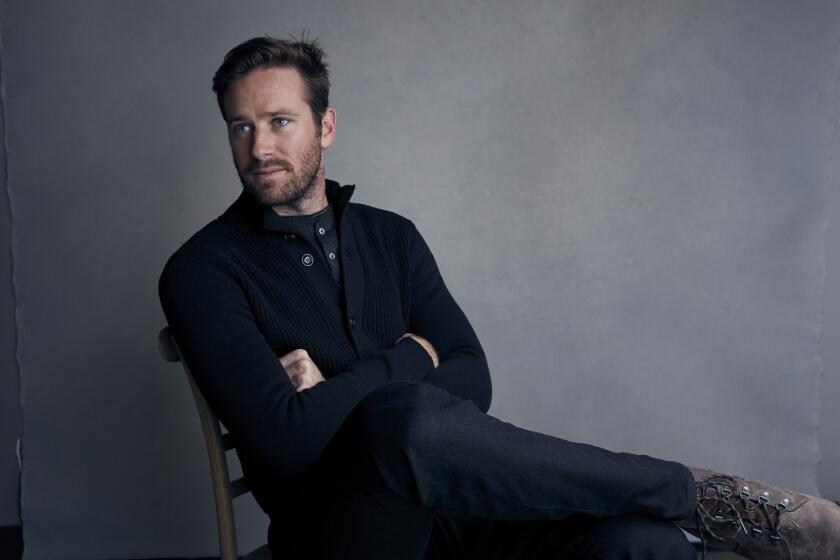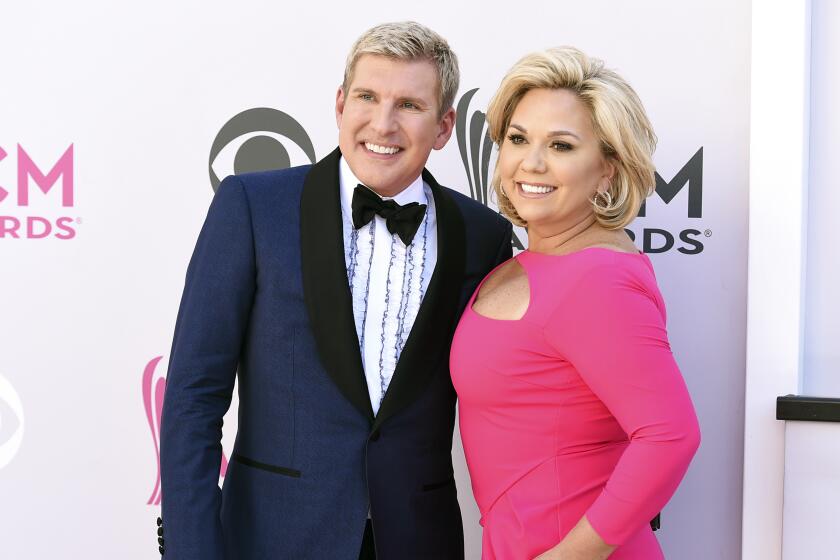Armie Hammer admits he ‘used people’ in first interview about sexual abuse allegations

- Share via
Two years after Armie Hammer was accused of raping a woman and allegedly coercing others to engage in aggressive sexual activities, the actor is discussing the allegations against him for the first time.
“I’m here to own my mistakes, take accountability for the fact that I was an asshole, that I was selfish, that I used people to make me feel better, and when I was done, moved on,” he says in a new interview with Air Mail. “I’m now a healthier, happier, more balanced person. … I’m truly grateful for my life and my recovery and everything. I would not go back and undo everything that’s happened to me.”
In the article, Hammer traces his interest in erotic BDSM practices to sexual abuse he says he suffered for nearly a year at 13 by a youth pastor of his church. He adds that he told his parents that the pastor made him uncomfortable, but they responded with an air of: “This is a man of God … How dare you say these kinds of things? He wants to give you attention, and that’s nice.”
“It introduced sexuality into my life in a way that it was completely out of my control,” explains Hammer. “I was powerless in the situation. I had no agency in the situation. Sexuality was introduced to me in a scary way where I had no control. My interests then went to: I want to have control in the situation, sexually. … because being out of control was very dangerous for me and very uncomfortable.”
The “Call Me by Your Name” actor’s career came to a halt in early 2021, when dozens of disturbing text message exchanges, in which Hammer allegedly disclosed cannibalistic desires, “master-slave fetishes” and BDSM obsession with numerous young women, were circulated online. Hammer was also accused of raping a woman in 2017, allegedly slamming her head against a wall and beating her feet.
“I tried to get away, but he wouldn’t let me. I thought that he was going to kill me,” the woman, identified as Effie, claimed of Hammer at a March 2021 news conference. “He then left with no concern for my well-being. I was completely in shock and couldn’t believe someone I loved did that to me. I tried so hard to justify his actions, even to the point of responding to him in a way that did not reflect my true feelings.”
Elli Hakami and Julian Hobbs began ‘House of Hammer’ soon after LAPD began investigating the actor. The accuser who started it all rejects the doc.
As his attorney did when the allegations took place, Hammer denies Effie’s accusation by clarifying that their encounter was what’s called a “consensual non-consent scene” — a practice Hammer said he learned about from Effie — and that “every single thing was discussed beforehand” during now-deleted conversations on Facebook Messenger.
“If I still had these messages, I would have been able to put this to bed in .5 seconds,” he says. “This alleged rape was a scene that was her idea. She planned all of the details out, all the way down to what Starbucks I would see her at, how I would follow her home, how her front door would be open and unlocked and I would come in, and we would engage in what is called a ‘consensual non-consent scene,’ CNC.”
“That’s a very important part of the BDSM world,” he adds. “The consent. Because you’re doing things that are pushing envelopes. You’re doing things that are beyond the [realm of] ‘Let’s have missionary sex with the lights off.’ You have to have that trust. You have to have that vulnerability with someone. You have to have that aspect of ‘I am willingly giving my control over to this person,’ … You know, the [the submissive partner] is the one who actually has all the power. Always. They’re the ones who can say ‘stop’ at any moment. They’re the ones who set the boundaries.”
Of the rape accusation, Hammer says, “I have never thrust this on someone unexpectedly. Never.” Because “the whole point of this is mutual pleasure. If you’re engaged in some sort of sexual act with someone and they’re not enjoying themselves, for me, I’m not enjoying myself. When two people are engaged in something, especially an intense scene, the symbiosis of it is what makes it magical. If one person’s not enjoying it and you feel that energy, maybe there are people who enjoy that, but that’s not me. I get so much pleasure giving someone pleasure.”
In the article, Hammer comments on his sexual activities with Courtney Vucekovich and Paige Lorenze, who both went public about his alleged cannibalistic desires. While he denies any non-consensual sexual activity or carving the letter A near Lorenze’s vagina with a knife — according to Hammer, he “lightly traced” his initial on her skin, with her permission and resulting in little blood — he acknowledges that “the power dynamics were off” in these relationships because of his age and fame and admits that he was emotionally abusive to his accusers.
“They could have been happy to just be with me and would have said yes to things that maybe they wouldn’t have said yes to on their own. That’s an imbalance of power in the situation,” he says. “I had a very intense and extreme lifestyle, and I would scoop up these women, bring them into it — into this whirlwind of travel and sex and drugs and big emotions flying around — and then as soon as I was done, I’d just drop them off and move on to the next woman, leaving that woman feeling abandoned or used.”
Savannah Chrisley gives a weepy update on how parents Todd and Julie are faring in separate federal prisons. Jesus and Spades are key, she says.
After Hammer lost his representation and was dropped from numerous projects, he contemplated suicide while quarantining in the Cayman Islands in early 2021, he says. “I just walked out into the ocean and swam out as far as I could and hoped that either I drowned or was hit by a boat or eaten by a shark,” he recalls. “Then I realized that my kids were still on shore, and that I couldn’t do that to my kids.”
Hammer says he’s had trouble keeping a job since the allegations surfaced — “No one will touch me, because if they hire me, then they are the people who support abusers,” he says — but after entering rehab for drug and alcohol abuse last year, he is working as a sober companion for a fellow recovering addict.
He holds onto a hope of returning to acting, as his friend Robert Downey Jr. has after a tumultuous chapter of drug charges and stints in jail: “There’s examples of people who went through really difficult times and experienced what Joseph Campbell would call ‘the hero’s death.’ And the hero must die so the hero can be reborn again,” he says.
“There are examples everywhere, Robert being one of them, of people who went through those things and found redemption through a new path. And that, I feel like, is what’s missing in this cancel-culture, woke-mob business. The minute anyone does anything wrong, they’re thrown away. There’s no chance for rehabilitation. There’s no chance for redemption. Someone makes a mistake, and we throw them away like a broken disposable camera. Robert and others are examples of what it looks like for a human being to experience pain and then growth. And that aspect of it is something that I aspire to.”
More to Read
The biggest entertainment stories
Get our big stories about Hollywood, film, television, music, arts, culture and more right in your inbox as soon as they publish.
You may occasionally receive promotional content from the Los Angeles Times.













